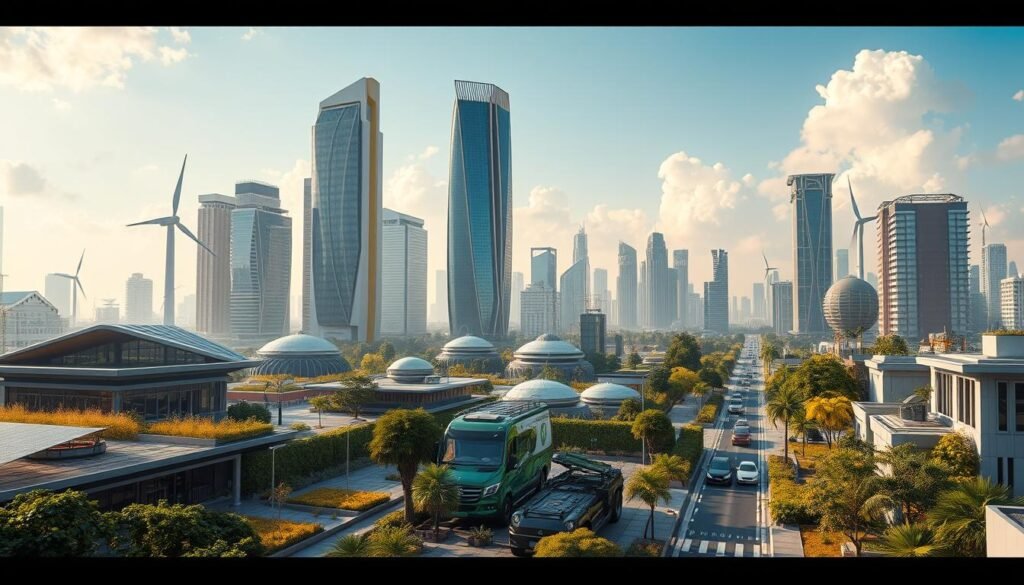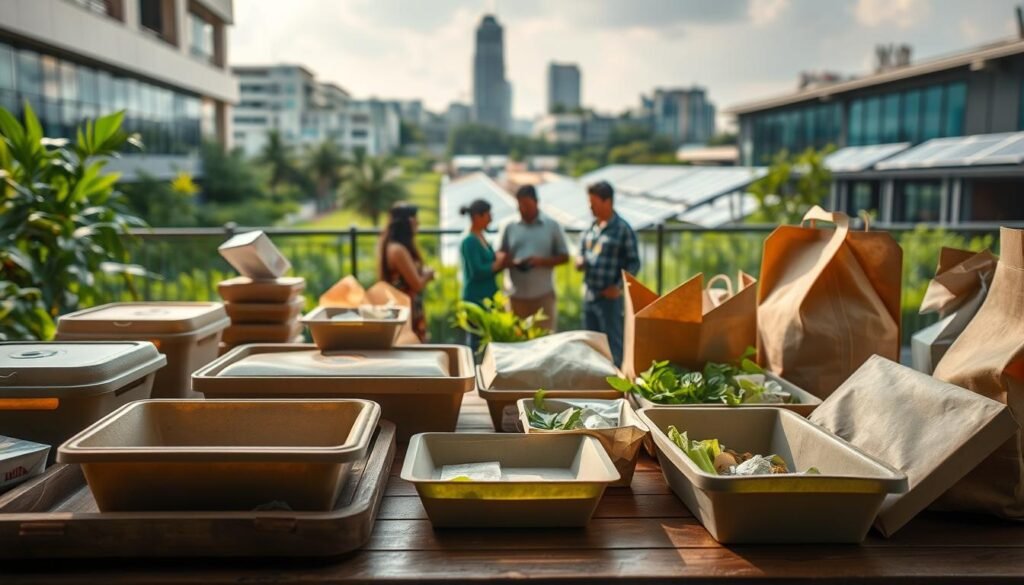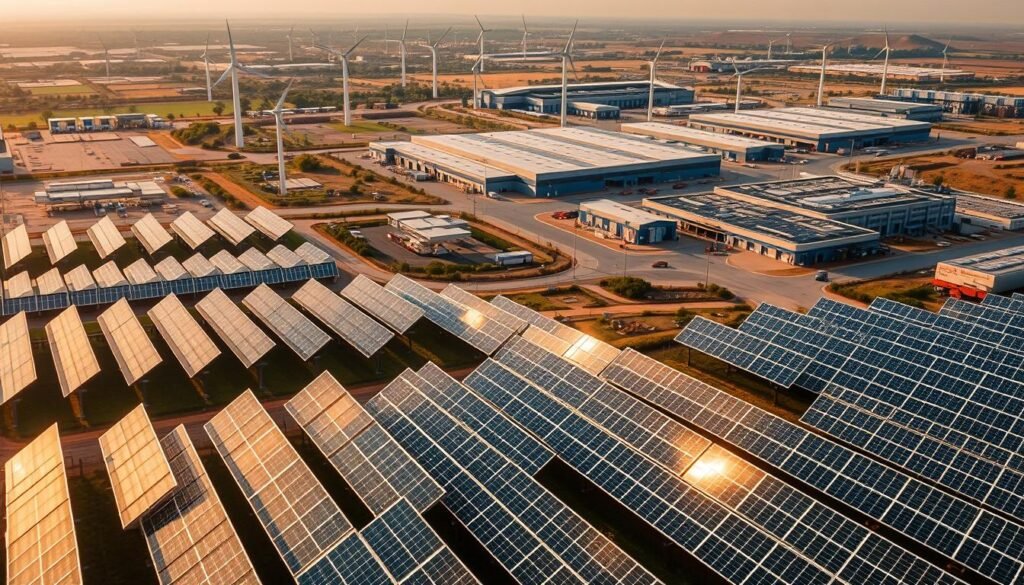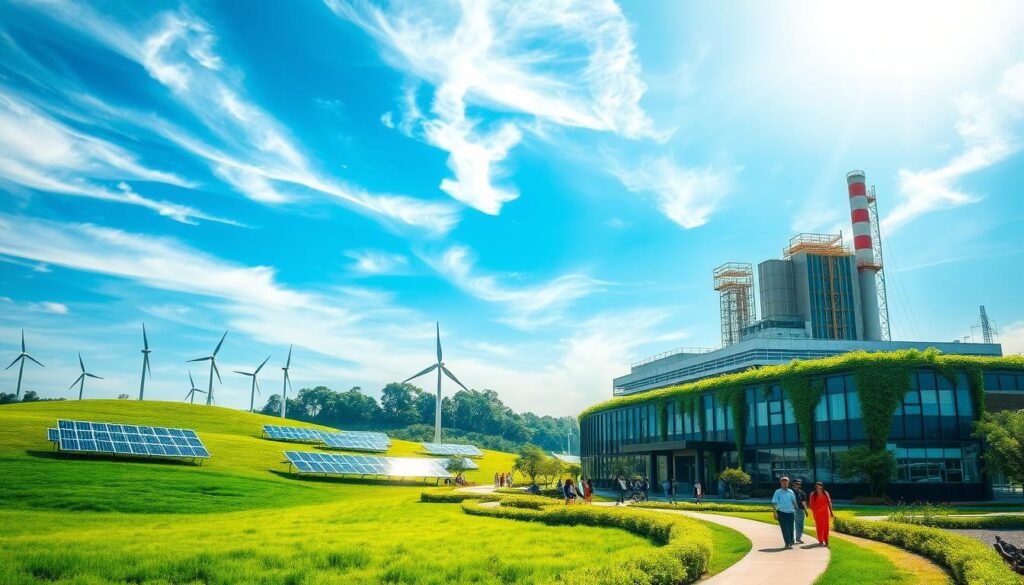Did you know India added 107,388 startups in just three years? That’s enough ventures to fill Mumbai’s Wankhede Stadium twice over. This explosion of innovation isn’t random – it’s fueled by a 172% surge in eco-conscious ventures since 2020, transforming how we approach commerce.
We’re seeing entrepreneurs turn everyday challenges into opportunities. From biodegradable alternatives replacing plastic packaging to smart logistics cutting carbon footprints, visionary founders are rewriting the rules. Government programs like Startup India now prioritize ventures merging profit with planetary care.
What’s driving this shift? Modern consumers spend 27% more on brands aligning with their values. Investors follow suit – climate-tech funding grew 290% last year. This creates perfect conditions for ventures that balance scale with sustainability.
The numbers tell a compelling story:
- Organic farming markets doubling every 4 years
- Waste management startups securing $1.2B since 2022
- 73% of urban Indians preferring eco-friendly deliveries
We’re not just building companies – we’re crafting ecosystems. By combining traditional wisdom with AI-driven solutions, today’s leaders prove environmental care and economic growth aren’t rivals. They’re partners in shaping India’s next chapter.
Innovative Green Business Models Driving India’s New Economy

Imagine agricultural waste strengthening tires and discarded printer cartridges fueling corporate sustainability. These aren’t hypotheticals – they’re real-world solutions reshaping industries. Forward-thinking ventures prove environmental responsibility and profitability aren’t mutually exclusive.
From Farm Waste to Industrial Gold
Tanmay Pandya’s Brisil Technologies turns rice husk ash – a farm byproduct – into premium silica for 8+ industries. Their secret? A patented process creating 97% pure dispersible silica used in everything from toothpaste to tires. Strategic partnerships helped them:
- Achieve 600% revenue growth (2024-25)
- Boost production capacity utilization from 45% to full throttle
- Enter global markets through eco-conscious supply chains
Closing the Loop on Tech Waste
Ravi Ravariya’s RCube Recycling tackles a hidden environmental villain: printer cartridges. Their circular model converts corporate e-waste into:
- INR 10+ lakh annual recurring revenue
- 40% cost savings for partner companies
- 100% traceable recycling processes
“Our clients don’t just dispose waste – they fuel a sustainability ecosystem that pays dividends.”
These companies exemplify how modern ventures thrive by solving multiple challenges simultaneously. They combine technical innovation with market-smart strategies, proving environmental impact scales when aligned with commercial viability.
Harnessing Eco-Friendly Opportunities: Biodegradable Packaging and Waste Management

India’s retail revolution now wears an eco-friendly wrapper. Over 63% of urban consumers actively seek brands using planet-safe packaging – a demand driving ₹800 crore market growth annually. This shift creates fertile ground for ventures transforming agricultural byproducts into commercial solutions.
Biodegradable Packaging Trends in India
Entrepreneurs are replacing plastic with materials whispering nature’s language. Bagasse containers from sugarcane waste decompose in 90 days – 450x faster than polystyrene. Startups report 40% month-over-month growth supplying:
- Corn starch pouches for spice brands
- Jute-based e-commerce mailers
- Edible rice starch wrappers
Initial investments of ₹10-15 lakh yield 3x returns within 18 months through partnerships with quick-commerce platforms and FMCG giants.
Implementing Circular Economy Strategies for Waste
Mumbai-based Plastroots redefined trash economics through Extended Producer Responsibility programs. Their model converts corporate packaging waste into:
- Recycled construction materials
- Biofuel pellets
- Raw materials for 12 industries
This approach generated ₹3 crore revenue while diverting 8,400 metric tons from landfills. “We don’t manage waste – we mine urban resources,” explains founder Riya Mehta. Their success blueprint combines IoT-enabled collection networks with AI-driven quality control systems.
The convergence of tech innovation and traditional materials creates scalable solutions. From coconut husk insulation to banana fiber textiles, entrepreneurs prove environmental care fuels commercial success. With 73% of corporations committing to zero-waste targets by 2030, this sector offers limitless potential for visionary founders.
Exploring Organic Farming and Sustainable Agriculture in India

Turning barren plots into goldmines isn’t a myth—it’s today’s agricultural reality. We’re seeing entrepreneurs grow ₹8 lakh annual profits from single-acre plots using chemical-free methods. This movement feeds two crucial needs: premium food for health-focused consumers and renewed soil vitality.
Rooted in Wisdom, Growing with Innovation
Startups prove ancient techniques work better when paired with modern science. Crop rotation patterns from 18th-century texts now combine with IoT soil sensors. This fusion creates:
- 28% higher yields than conventional farms
- 40% lower water consumption
- ₹50/kg premium pricing for organic produce
Native plant nurseries demonstrate how low investments create high impact. With ₹1-3 lakhs, entrepreneurs grow species adapted to local conditions. These plants require 75% less maintenance while supporting regional ecosystems.
| Model | Investment | Key Benefit | Time to Profit |
|---|---|---|---|
| Organic Vegetables | ₹3-5L | 25% price premium | 8-14 months |
| Native Plants | ₹1-3L | Low maintenance | 6-9 months |
| Hydroponic Units | ₹5-10L | Year-round production | 12-18 months |
Urban gardening solutions connect city dwellers to their food sources. Hydroponic setups in Mumbai apartments yield 150kg monthly—enough to supply local cafes. “We’re not just growing greens,” shares founder Arjun Patel. “We’re cultivating community relationships through every harvest.”
These models show how business success grows from respecting nature’s rhythms. By prioritizing soil health and people‘s wellbeing, farmers build enterprises that nourish both land and livelihoods.
Green Logistics and Renewable Energy for a Sustainable Supply Chain

Logistics networks now run on sunlight and smart tech. Over 21% of Indian MSMEs already use solar-powered operations, cutting costs while boosting reliability. This shift isn’t just about panels – it’s reimagining entire supply chains through renewable integration.
Solar-Driven Logistics in Action
Chennai’s SunTrack Logistics demonstrates what’s possible. Their 100 kW solar installation powers:
- Electric delivery fleets
- Warehouse cooling systems
- IoT-enabled tracking devices
This setup slashed energy bills by 85% while achieving 24/7 operations. “Our trucks now run on sunshine,” explains founder Priya Reddy. Initial ₹60 lakh investments pay back in 42 months through government subsidies and fuel savings.
The numbers reveal why companies are switching:
- ₹5-8 lakh entry costs for residential solar setups
- 90% reduction in commercial electricity expenses
- 31% of manufacturers using energy-efficient machinery
Smart energy management systems take this further. Real-time data optimizes:
- Route planning to minimize fuel use
- Load balancing across distribution hubs
- Predictive maintenance schedules
These innovations prove clean energy isn’t just eco-friendly – it’s commercially superior. As corporate sustainability targets tighten, entrepreneurs who master renewable integration will lead India’s supply chain revolution.
Green is the New Gold: Sustainable Business Ideas for India’s New Economy

India’s entrepreneurial energy meets environmental consciousness in unexpected ways. Consider this: bamboo toothbrush makers now compete with multinational brands, while urban refill stations reduce plastic use by 83%. These ventures prove ecological awareness drives modern commerce.
Current market trends reveal fascinating patterns. Over 68% of shoppers under 35 actively research brands’ sustainability credentials before purchasing. This shift creates fertile ground for ventures combining innovation with earth-friendly practices.
| Sector | Opportunity | Investment Range | Market Potential |
|---|---|---|---|
| Agriculture | Vermicompost Units | ₹2-5L | ₹900 Cr by 2026 |
| Manufacturing | Bamboo Products | ₹10-15L | 42% CAGR |
| Services | Green Event Planning | ₹5-7L | ₹650 Cr industry |
| Technology | Solar Microgrids | ₹20-30L | 1.2M homes powered |
Successful businesses balance profit and planet through smart positioning. Hydroponic farms near metro cities achieve 35% margins by supplying premium greens to hotels. Refill stations partner with housing societies, creating recurring revenue streams.
Consumer expectations drive innovation. “Our clients want solutions that fit their values and lifestyles,” notes eco-designer Kavya Mehta. Her upcycled fashion line uses textile waste from 11 factories, turning trash into ₹25 lakh monthly revenue.
The content of modern entrepreneurship now includes measurable impact. From carbon-neutral deliveries to plantable packaging, ventures that quantify environmental benefits capture 73% more investor interest. This synergy between ethics and economics defines India’s commercial future.
MSME Transition: Leveraging Government Initiatives and Green Financing
Indian MSMEs account for 10-15% of industrial emissions – a statistic now driving urgent innovation. We’re witnessing enterprises transform this challenge into competitive advantage through strategic partnerships and smart financing.
Accessing Government Support and Subsidies
Forward-thinking ventures tap into schemes like the Green Credit Programme offering 30% capital subsidies for eco-upgrades. The Modified PMEGP provides ₹25 lakh loans at 6% interest for ventures adopting circular models. Key benefits:
Solar-powered units gain 40% reimbursement on installation costs. Waste recycling initiatives access tax holidays under Section 80-JJA. State programs like Kerala’s Hi-Tech Mission offer ₹10 lakh grants for adopting clean technologies.
Overcoming Financial Barriers for Green Transition
Blended finance models bridge funding gaps effectively. NBFCs now offer green loans with 2% lower rates for businesses reducing emissions. Success stories show:
Hyderabad’s EcoPack Solutions secured ₹1.2 crore through SIDBI’s Sustainable Finance Scheme, scaling biodegradable packaging output 300%. Collaborative platforms connect MSMEs with impact investors – 73% report faster funding approvals when demonstrating measurable environmental value.
These pathways prove ecological responsibility fuels commercial resilience. With 68% of lenders prioritizing sustainability metrics, aligning operations with planetary care isn’t optional – it’s strategic evolution.




